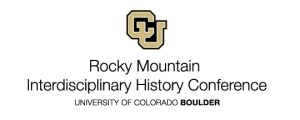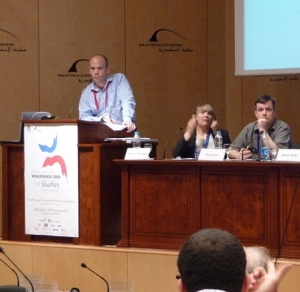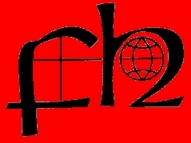 Cali Pitchel McCullough is a Ph.D student in American history at Arizona State University. For earlier posts in this series click here. –JF
Cali Pitchel McCullough is a Ph.D student in American history at Arizona State University. For earlier posts in this series click here. –JF
[Reposted by permission of John Fea’s The Way of Improvement Leads Home]
I always enjoy my time in Southern California. Every six weeks I take a quick flight from Phoenix into Burbank to spend the weekend visiting a few of my favorite people. My uncle, a PR executive, lives in Sherman Oaks, and a close friend works for the Associated Press and lives one block off Hollywood Blvd. My geographical zone remains relatively small while visiting. I might enjoy the sunshine and cool air in my uncle’s backyard, or I stay with my friend in her tiny apartment, watching chick flicks and eating take-out.
During the past weekend, I ventured out of my typical routine and drove north and west along the Pacific Coast Highway toward Malibu. Rather than celebrity-watch at a beachside café, I spent Saturday participating in the
Western Regional Conference on Faith and History. The Conference met on the campus of Pepperdine University, situated on a bluff overlooking the Pacific Ocean. I drove the meandering road from the 101 Freeway into the Malibu Valley before the sunshine and heat dispelled the morning fog, but after the second panel the haze lifted. The ocean views made conference-going a difficult option, but the intriguing panel line-up drew me inside.
The conference theme, “The Historian and the Text,” seemed the perfect forum to discuss
History to the People. I submitted my unorthodox proposal to Bryan Lamkin, the President of the Western Regional chapter of the CFH and Professor of History at Azusa Pacific University. My proposal looked more like a call to action than scholarly research, but it undoubtedly aligned with the theme of the conference. To break down the barriers between academic historians and people and to provide the general public with the skills necessary to think historically are two of the main tenants of HTTP.
I presented in a panel entitled “Public Texts” with Steven Wentland, a Professor of Liberal Studies at Azusa Pacific. Dr. Wentland examines the challenges teachers face incorporating the study of religion into lesson plans (despite their overwhelming presence in state standards). He offers some prescriptions, because he suggests “you can’t understand American history without studying religion.”
Ryan McIlhenny, from Providence Christian College, provided comments for Dr. Wentland and I. Dr. McIlhenny suggested we had several points in common, most importantly, our commitment to preserving democracy and diversity in the study of history. HTTP will attempt, through a more democratic use of the historian’s tools, to teach others to lay aside self-interest and see the world from the perspective of someone else. As John Fea suggests, “unlike any other discipline, history requires us to engage the human condition primarily through understanding and empathy, not criticism.” This quote gets to the second point in common between Dr. Wentland and I—the culture wars. If a person encounters the text with the necessary tools, it becomes less easy to condemn the actions of other people. Perhaps we can ease our culture wars by disclosing the ways in which we’ve honed our historical thinking and encouraging such behavior in more people in a more intentional way.
The audience seemed enthusiastic about HTTP. Aside from some brief discussion on this blog, I have not had the chance to present the idea to an academic audience (other than my classmates). I received great questions at the end: How will we achieve nuance and complexity in short blog posts? How will we reorientate the way in which people think about history? How will we protect ourselves against bias? These are great questions, some of which I have already spent a good deal of time thinking through. At HTTP we value specificity and we write and edit in a community. This keeps us morally engaged, accountable, and self-critical. A willingness to work collaboratively, in a community of scholars open to debate and dialogue and the testing of ideas keeps us honest—this goes for all good history.
I had a great experience at the Western Regional CFH. It provided me the opportunity to not only present an idea, but it also gave me the opportunity to think about how my faith plays a role in my commitment to bring history to the people. In preparing for the conference I found a quote by Henri Nouwen, a twentieth century priest and writer. Nouwen, meditating on the gifts given to a body of believers, believed that “the basis of all ministry is the experience of God’s unlimited and unlimiting acceptance of us as beloved children, an acceptance so full, so total, and all-embracing, that it sets us free from our compulsion to be seen, praised, and admired and frees us for Christ, who leads us on the road of service. This experience of God’s acceptance frees us from our needy self and thus creates new space where we can pay selfless attention to others.” Because I have acquired certain skills, I have a responsibility to use these skills in service to others. The website provides a space for me to share these skills outside the classroom, and in hopes, foster a sense of historical thinking that might change the world one person at a time.
 academy. You have a seminar paper that “ain’t so bad” and you’re ready to share it with the world. Okay, well not THE WORLD, yet… but you want to share it with someone other than your advisor (who hates it) and your mother (who loves it). Where, pray tell, can you find such a place?
academy. You have a seminar paper that “ain’t so bad” and you’re ready to share it with the world. Okay, well not THE WORLD, yet… but you want to share it with someone other than your advisor (who hates it) and your mother (who loves it). Where, pray tell, can you find such a place?



